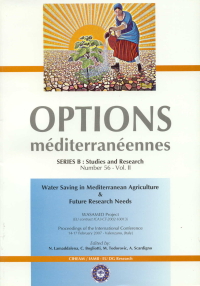| Article précédent | p. 73-84 | Article suivant |
Effect of supplementary saline irrigation on yield and stomatal conductance of wheat under the Mediterranean climatic conditions
The response of wheat (Triticum aestivum) to different salinity levels of irrigation water was investigated in Adana, Turkey, during the 2001-2002 growing season. Saline waters with electrical conductivity values of 0.5 (canal water), 3.0, 6.0, 9.0 and 12.0 dS/m were used for irrigation of wheat. The average grain yields ranged from 5940 to 6484 kg/ha in different treatments. the effect of salinity levels of irrigation water used in the study on grain yields was not significantly different (P<0.4057). Average dry-matter yields varied from 1506 to 1691 g/m2 from the different treatments at harvest time. However, treatments resulted in similar biomass yields (P<0.3664). Water use efficiency (WUE) values from the treatments ranged from 1.29 to 1.44 kg/m3. As the salinity level of irrigation water increased WUE values also increased slightly. harvest index (HI) values from the different treatments varied from 0.38 to 0.42. However, there was no significant difference among the treatments. Generally soil salinity increased with salinity content of irrigation water used in the study. Soil salinity decreased almost linearly with increasing depth in the profile. There was no well-defined relationship between stomatal conductances of wheat leaves and irrigation water salinities under the study conditions. Thus, the results obtained provide a promising option for the use of poor quality water can be used for irrigation of wheat crop in the Mediterranean region without undue yield reduction and soil degradation since effective winter rainfalls leach the salts out of the root zone as long as an efficient drainage system is provided.
La réponse du blé (Triticum aestivum) à différents niveaux de salinité de l'eau d'irrigation a fait l'objet d'une étude à Adana, en Turquie, pendant la saison 2001-2002. De l'eau salée, ayant une conductivité électrique de 0.5 (eau douce) 3.0, 6.0, 9.0 et 12.0 dS/m, a été utilisée pour irriguer le blé. Les rendements moyens des grains variaient de 5940 à 6484 kg/ha selon les différents traitements. L'effet du niveau de salinité de l'eau d'irrigation sur les rendements des grains n'était pas significativement différent (P<0.4057). Les rendements moyens en matière sèche variaient de 1506 à 1691 g/m2 selon les traitements au moment de la récolte mais ils étaient similaires pour la biomasse (P<0.3664). Le blé n'a été irrigué que deux fois pendant le cycle cultural et les pluies ont été assez importantes si bien que la salinité apportée par l'eau d'irrigation est restée à des niveaux acceptables et n'a pas affecté le rendement en biomasse du blé. L'eau saline peut donc être utilisée pour irriguer le blé dans la région méditerranéenne si des pluies hivernales efficaces lessivent le sel de la zone racinaire et si l'on prévoit un système de drainage efficace.
- [ Afficher ]
- [ Télécharger ]
- [ Exporter la citation ]
Vous pouvez télécharger la citation au format :
- [ Imprimer ]
-
Mots-clés
EAU SALINE, EFFICACITE, IRRIGATION, RENDEMENT DES CULTURES, STOMATE, TENEUR EN MATIERE SECHE, TRANSPIRATION, TRITICUM AESTIVUM, TURQUIE, UTILISATION DE L'EAUCiter cet article
Yazar A., Hamdy A., Gençel B., Sezen M.S., Koç M. Effect of supplementary saline irrigation on yield and stomatal conductance of wheat under the Mediterranean climatic conditions. In : Lamaddalena N. (ed.), Bogliotti C. (ed.), Todorovic M. (ed.), Scardigno A. (ed.). Water saving in Mediterranean agriculture and future research needs [Vol. 2]. Bari : CIHEAM, 2007. p. 73-84. (Options Méditerranéennes : Série B. Etudes et Recherches; n. 56 Vol.II). Proceedings of the International Conference WASAMED Project (EU contract ICA3-CT-2002-10013), 2007/02/14-17, Valenzano (Italy). http://om.ciheam.org/om/pdf/b56_2/00800178.pdf



